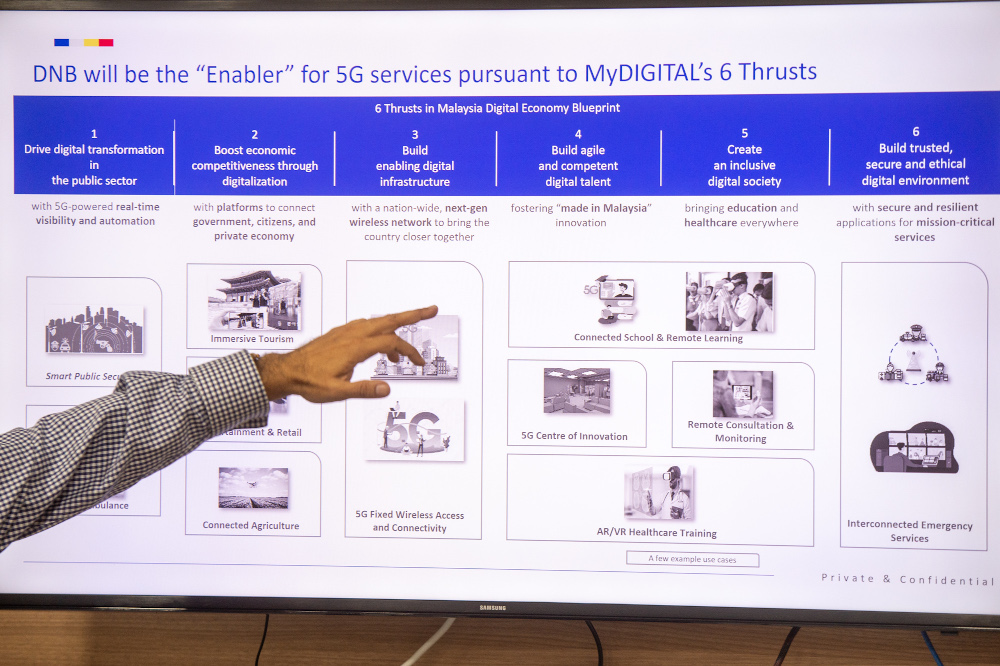Prem Kumar Menon, DNB’s head of strategy, wants to showcase the full potential of 5G to consumers. — Pictures by Shafwan Zaidon
KUALA LUMPUR, Nov 8 — Malaysian consumers and innovators will soon see how ultra-fast 5G connectivity can transform work and life, at a one-stop centre in the city’s future “financial centre” to be ready next year.
Digital Nasional Berhad (DNB) said it wanted to create a space that will help demonstrate what that technology can offer, in order to better convey its enormous potential to the country.
The centre will be located in TRX and scheduled to open at the end of the second quarter of next year.
“It would be an innovation centre that would allow people to test 5G services and capabilities,” said Prem Kumar Menon, head of strategy for the state-owned firm in charge of developing the underlying infrastructure.
“What we’re trying to do is make more innovators in Malaysia adopters of the technology.”
Putrajaya has identified 5G as the pivotal enabler to an internet-based economy, a crucial area of growth needed to create high-skilled jobs as the country bids to join the ranks of other rich economies.
Malaysia is already trailing regional peers in terms of its 5G preparedness.
DNB, set up and wholly-owned by the Ministry of Finance, was established to speed up the groundwork for 5G deployment, with the ambition of catching up with the rest, or possibly beat them by 2025.
The fifth generation of the technology standard used for mobile broadband communications, 5G has been touted as providing the high-speed connectivity and increased bandwidth needed for new breakthroughs in commercial and consumer technology.
These include wider applications of virtual and augmented reality (VR/AR) in both business and consumer applications, faster and more reliable telecommunications, and increasingly connected appliances or the so-called Internet-of-things (IoT).
Prem said the early goal is to make 5G as accessible to as many people as possible.
Currently, the adoption of such applications is still low due to the limits of the current generation of wireless connectivity, but Prem said 5G would allow more average consumers to eventually access such technology.
He acknowledged that this would still ultimately depend on the associated data price, but said the early goal is to make 5G as accessible to as many people as possible.
“At least that’s the aim but at the end it depends on the operators that are going to provide the services,” said Prem.
“Our job is to try our best to make 5G available to all.”
The Malaysian Communications and Multimedia Commission estimated that the technology could add up to RM13 billion in GDP output between 2021 to 2025.
All sectors of the economy are expected to benefit from 5G internet, according to them, down to the small traders in rural parts of the country, as the government expects its 5G infrastructure to provide coverage even in places where transmission can be problematic.
DNB said that all sectors of the economy are expected to benefit from 5G internet.
At a bigger scale, 5G could potentially level the playing field.
Smaller factories can now equip themselves with faster robots and detailed inspection capabilities for products down the assembly line, made cheaper by 5G connectivity.
The same technology can now be made accessible to small farmers, possibly helping them to increase crop yields and remove “middle-men” to sell fresh produce to wholesale markets or even individual customers with the help of faster and more powerful algorithms.
When asked if Malaysians are ready to make full use of 5G, Prem said it would take time.
“What’s important is to make sure everyone can taste what the technology can offer,” he stressed.

